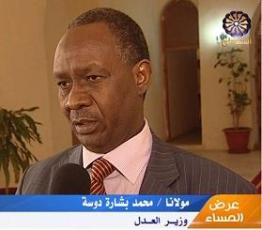Sudan to conduct thorough review of immunity laws
September 2, 2013 (KHARTOUM) – The Sudanese ministry of justice has announced that it will embark on a comprehensive review of current laws granting immunity to senior government officials, military, police and security personnel.

Sudan’s attorney-general, Omer Ahmed, told reporters on Monday that immunity enjoyed by government and security officials hampers the course of justice and draws criticism to the competency of the country’s legal system which necessitates making major amendments.
Ahmed predicted that the workshop will recommend an overhaul of immunity laws as it prevents authorities from taking legal action against individuals who violate the law and commit crimes.
The opposition, however, downplayed the announcement and said that recommendations provided by the ministry of justice will not be implemented due to structural problems in the nature of governance, emphasising that legal reform would only take place through a transitional period involving truth and reconciliation.
The head of the opposition Democratic Lawyers Alliance, Amin Mekki Medani, blasted the Sudanese judiciary, saying it is not neutral and turns a blind eye to violations committed by security forces against activists and opposition.
Medani recalled that perpetrators of crimes against innocent citizens in Port Sudan events in 2005 and Kajbar in 2007, which led to the death of more than 30 people have yet to be prosecuted.
The International Criminal Court (ICC) has issued arrest warrants for Sudanese president Omer Hassan Al-Bashir, his defence minister, Abdel-Rahim Mohamed Hussein, and the governor of North Kordofan, Ahmed Haroun, in connection with war crimes, crimes against humanity and genocide allegedly committed in Sudan’s western Darfur region.
The Sudanese opposition asserts that the ICC rulings is further evidence about the weakness of the local justice system.
In 2004, the UN Security Council (UNSC) formed a commission of inquiry headed by former president of the International Criminal Tribunal for the Former Yugoslavia (ICTY), Antonio Cassese, to look into Darfur abuses.
The commission concluded that Khartoum and government-sponsored Arab militias known as the Janjaweed engaged in “widespread and systematic” abuse that may constitute crimes against humanity.
They further said that Sudanese judiciary is “is unable or unwilling” to prosecute those crimes and thus recommended referring the situation to the ICC.
Over the years Sudan has appointed several special prosecutors and established special courts to go along with them in order to deflect the criticisms over Darfur justice and convince the UNSC to freeze proceedings against Bashir. But to date no high-profile prosecutions have taken place.
(ST)
